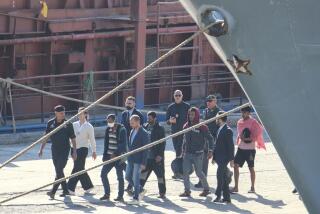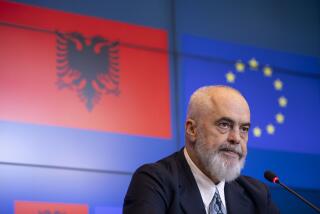4,000 Happy Albanians Reach Refuge in the West
BRINDISI, Italy — The repressive curtain around Europe’s most backward society was flicked aside revealingly Friday for the first time in 45 years as about 4,000 grimy but exuberant Albanians streamed ashore here to new lives in Western refuge.
The refugees emerged almost trance-like from an internationally sponsored boatlift that transported them from a homeland wrapped in stubborn Stalinist isolation since the end of World War II.
“We worked, the Communist leaders ate. I will go home again when Albania is free,” said unshaven factory worker Rudolph Hadahami, fingering the unfamiliar plastic wrappings around a piece of cake.
As they came ashore in bright sunshine, the Albanians looked as though they had stepped through a time warp.
The women wore plastic shoes and homemade dresses of cheap, shiny fabric in styles long forgotten in Western Europe. Nearly all the men wore shapeless sandals and flared trousers of 1970s inspiration.
“They were very frightened at first. You could feel their fear. Was it really over? Or just a trick?” said Claudio Luksich, chief engineer on Espresso Grecia, one of the four ships sent to Albania to bring the refugees here.
The four ferries chartered by Italy and West Germany brought 3,915 Albanians to Brindisi after a four-hour, 85-mile passage of the Adriatic from the Albanian port of Durres. A fifth ship, under French charter, was bound for Marseilles early today carrying another 550 refugees.
Most of the arrivals were rough-cut, single young men, but the first Albanian ashore here Friday, wrapped firmly in the arms of an Italian Red Cross nurse sprinting for a waiting ambulance, was a three-day-old baby born at the West German Embassy in Tirana.
In all, about 3,100 refugees had taken shelter at the German legation in the Albanian capital. Within two hours of landing in Brindisi, they were northward-bound aboard three 20-car trains staffed by the West German Red Cross and unarmed Bavarian border police.
About 850 Albanians who had jammed the Italian Embassy in Tirana went by bus from the port to clean beds, hot showers and restorative pasta at a disused Italian army depot outside this port, about 335 miles southeast of Rome.
The Albanians came to Italy tired and travel-stained. Many were barefoot; some had no shirts. Clothes slept in for a week or more had not aged well. Everybody needed a bath.
As refugees, they were archetypal: Literally all they had was what they were wearing when they voted with their feet against an Albanian regime that is the last hard-line Communist government in Europe.
Beginning June 28, the Albanians--alone on the spur of the moment, with friends, with entire conspiring families--had stormed Western embassies in the capital seeking asylum from the repression and poverty of a country where yearly per-capita income is less than $1,000 and the list of political crimes is long.
“I love my country. It is terrible to leave, but for me this is a political emigration. I want to study, I must be free,” said a 25-year-old named Vilma from Tirana whose carriage and hazel eyes brought photographers swarming.
“Albanians are still afraid of the police, but communism is finished. People are rising up,” said Gregor Posto, 34, bound for Germany with his wife and three small children.
The boatlift was the fruit of long negotiations between Western governments, the United Nations and the shaky, timidly reforming regime of Albanian strongman Ramiz Alia.
While diplomats palavered, refugees said, conditions at the overcrowded embassies went from bad to worse. Food was short, water precious.
“There was water only four or five hours a day. The government shut it off; it was medieval, like living in a castle, surrounded,” said Nuri Kercani, 27, an economist and one of a minority of intellectuals among the refugees proud of their learned-at-home Italian, English or French.
“The government sent spies into the embassies, saying we’d be driven out. We hid from them, afraid that if we were identified, they would take reprisals against our families,” said a 20-year-old youth named Gentian who asked not to be identified further.
Like many of the refugees, Gentian, whose complaints about Albania are as much economic as they are political, hopes eventually to go to the United States.
Proud and sassy in a new purple T-shirt and yellow skirt, courtesy of the Italian Red Cross, Gertruda Reka, 23, a factory worker in Tirana, sought out American reporters in the swirling mob of journalists that tracked the refugees’ every step.
“Do you know Cela Hamide in Yonkers, New York?” she asked in slow, careful English. “She is my grandmother. That is where I want to go.”
Brindisi’s welcome for Adriatic neighbors who have not been seen here for half a century began promptly at 9 a.m. on a wind-whipped summer’s day when the white-over-mustard Espresso Grecia, a U.N. ensign at her forepeak, breasted a harbor that once sheltered Imperial Roman merchantmen.
Worried by two tugs and an Italian Coast Guard launch, the ferry jockeyed for a berth while 1,000 Albanians at the rails clapped and roared “I-tal-ia, I-tal-ia!” just as they had heard soccer fans do on television broadcasts of soccer’s World Cup.
A few hours behind the Espresso Grecia came her sister ship Appia, and the Greek ferries Ionis and Cefalonian Sky. Loaded at the same time but Marseilles-bound was the Orient Star.
Under international diplomatic protection and tight Albanian police vigilance, the refugees had been loaded onto buses in Tirana on Thursday night for the 20-mile ride to the port. The refugees agreed on that, but not on what happened along the way.
“The streets were full of soldiers, but people applauded as we passed. You who have liberty don’t appreciate it, but we Albanians understand what freedom is,” reported Paret Derani, 65, who said he spent 28 years in jail for political offenses.
“People watched from streets and balconies in silence as we left. No one clapped, no one shouted. It is impossible to shout in Albania,” said economist Kercani.
If the refugees came in relief and joy, a few came in unsuppressed anger at the regime they had fled.
Nevres Tabaku, 59, breathed fire in impeccable Italian from the moment she stepped ashore.
“We are known as the 100-year family,” she said. “Do you know why? Because family members have spent a total of 100 years in their jails. My parents died there. We never saw their bodies. My mother, a mother of seven, was arrested for the last time when she was 55.
“I have been in jail, my brothers, my sons. We owned a family business when the Communists came. At first, they jailed us for no reason, and then for any reason. Now, today, we, the whole family, is out. There was no reason any more to remain silent. I can say what I want.”
Tabaku added that she hopes to join relatives in New York or Florida.
More to Read
Sign up for Essential California
The most important California stories and recommendations in your inbox every morning.
You may occasionally receive promotional content from the Los Angeles Times.










